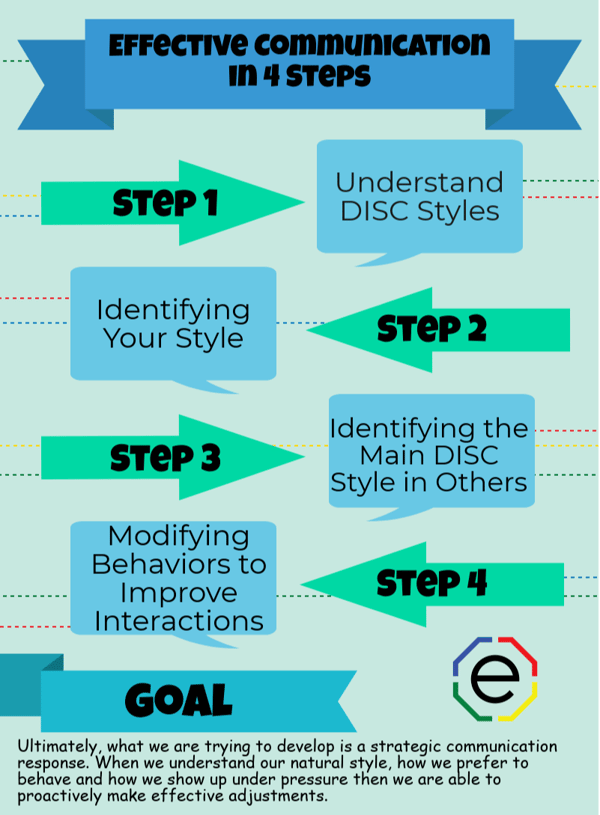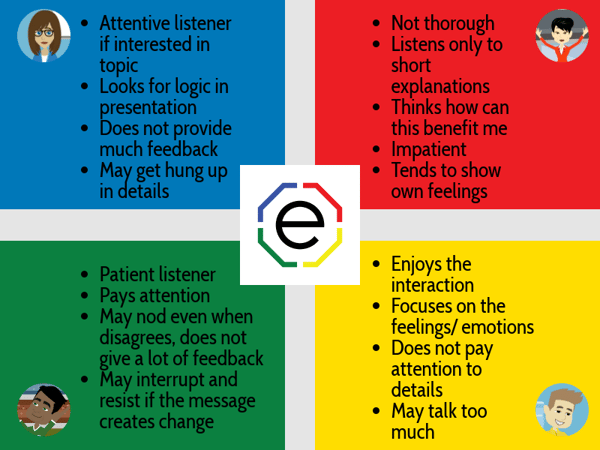Why don't people listen to me?
It's summertime and as a mother of a 9-year old boy, I feel like I'm repeating myself more than usual. Some days I wonder if his ears really work or if they are painted on? Then I realized, it's not limited to just my 9-year old who doesn't listen to me; it happens at work, at stores, at restaur ants; heck it happens just about anywhere!
Now, when I say people don't listen to me, I'm not talking about blatant disrespectful not listening; I'm talking about people just not hearing my message. Either it's ignored or misunderstood. Has that ever happened to you? Not only can it be frustrating; but this miscommunication can also cause errors, re-work, lower productivity, and interpersonal conflict. So I wonder, can learning DISC really help others listen to me better? If so, sign me up!

4 steps to effective communication
Okay, so while DISC can't make people listen to me better, the Extended DISC system does take me through 4 steps to effective communication which teaches me how to adjust my own behavior to interact more successfully with others. At the end of the day, I don't have the power to change anyone else (regardless of how much I wish I could) except myself.

So, if I want others to hear my message correctly the first time; I need to learn how they prefer to take in information and adjust my own communication to match their preference. The 4 steps to effective communication teaches us just that. Step 1 is to understand how people are similar and different. We use the DISC model to help us understand those similarities and differences. Step 2 is to understand our own behavioral style(s) better and how others perceive someone with our style. Step 3 is learning how to identify the styles of others so we know how best to move into Step 4 which is to modify our behaviors to improve interactions.
First, we need to understand that self-awareness is a gift. We accept who we are and we are responsible for our own behaviors. We can choose or not choose to modify our behaviors. What we can't do is to change others. We can only control ourselves. You simply have to understand what drives people and recognize your options for dealing with them. Consider interacting with people they way they prefer to interact.
What resources are available to help me understand the 4 steps to effective communication? And are there any that focus specifically on listening?
 Listening is part art, part science, and mostly practice. The Extended DISC assessments provide insights into your natural behavioral tendencies. The report provides a lot of great information about your natural communication style, but how can you dig deeper and look specifically at your listening preferences? Well, we have a reinforcement report designed solely around your listening style.
Listening is part art, part science, and mostly practice. The Extended DISC assessments provide insights into your natural behavioral tendencies. The report provides a lot of great information about your natural communication style, but how can you dig deeper and look specifically at your listening preferences? Well, we have a reinforcement report designed solely around your listening style.
When we create our communication messages we often create them based on our own communication preferences. Well, that only works if the other person is just like us. First we need to understand our own listening preferences. What comes easy to us and what is challenging. Next, we need to understand how other style(s) prefer to listen so we'll know how best to modify our behaviors to increase the likelihood of our message being heard and understood.
How do D-styles prefer to listen?
D-style individuals like to be large and in charge. Oftentimes the communication is one way - I (D-style) talk, you listen. They are often viewed as impatient listeners. They prefer executive summaries versus the nitty gritty details. So, when you communicate with a D-style be brief and to the point. Illustrate how what you have to say will benefit them. Also, providing a D-style with options or choices will help them feel like they have a sense of control; which will ultimately, help your message be heard.
How do I-styles prefer to listen?
I-style individuals are social, outgoing and talkative. Oftentimes they prefer to talk versus listen. Because I-styles are more people oriented they will focus on the feeling and emotions in communications; not on the tasks. Therefore, they are not interested in the details. I-styles like to be liked; so be sure to maintain their self-esteem when communicating with them. Keep your message focused on the positive and provide them with opportunities to express themselves.How do S-styles prefer to listen?
S-style individuals are calm and steady. They are often seen as patient and active listeners. In fact, they prefer one way communication--you talk, I (S-style) listen. However, S-styles will interrupt or may even resist if the message is about change. Therefore, when communicating with a S-style, make sure you provide them with all the details. Take your time to explain the details and ask them specific questions to draw out their opinions. Provide them with support and assurances.
How do C-styles prefer to listen?
C-style individuals are interested in details, facts, and ask a lot of questions. They are often seen as attentive listeners; however that's only if they are interested in the topic. Find a topic that interests them and you'll be sure to have their full attention. C-styles oftentimes don't easily express their emotions or feelings so others have a difficult time understanding what they are truly thinking or feeling. When communicating with a C-style, slow things down. Focus on the details and quality. Be patient in answering their questions. Provide them with materials in advance to review so they are prepared for the conversation when you meet.

So, the next time I realize my message wasn't heard, I think I'll pause and remember my DISC knowledge. I wish there was a magic pill to make others listen to me; but there isn't. I need to apply my DISC knowledge. It'll take work. I'll make mistakes. I won't get it right every time. And that's okay. With practice it will get easier. Who knows, maybe when my son is 20 years old he'll listen to his mother. Until then, be curious and continue to apply DISC.

